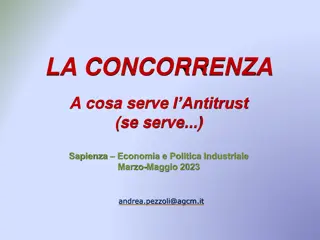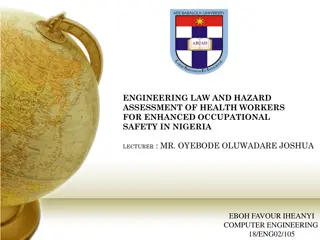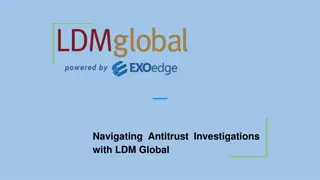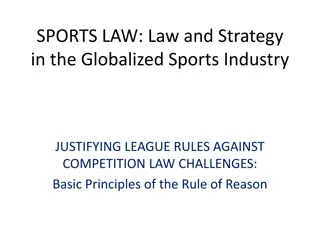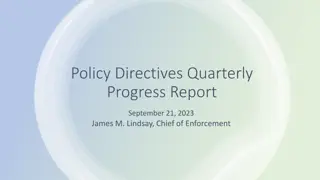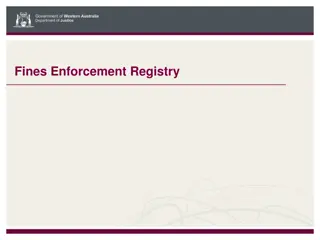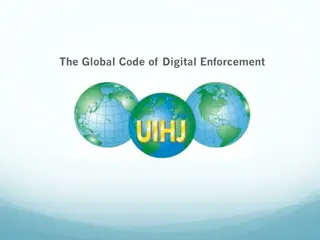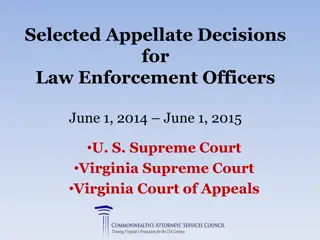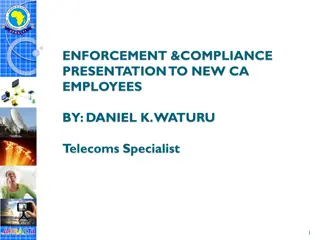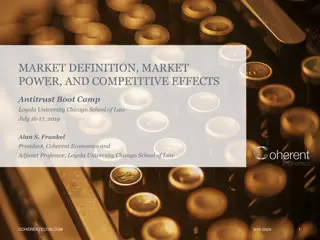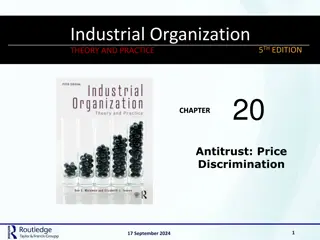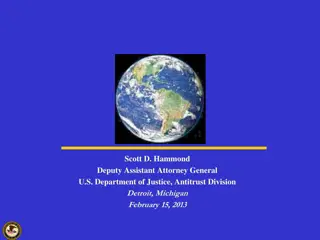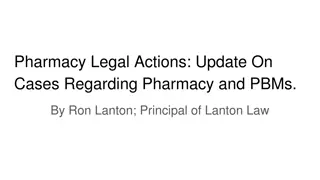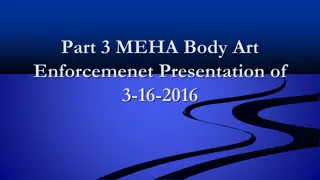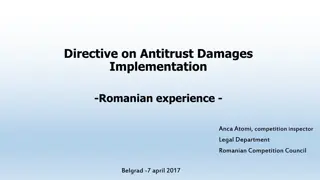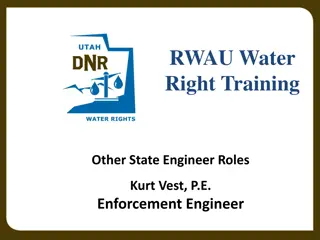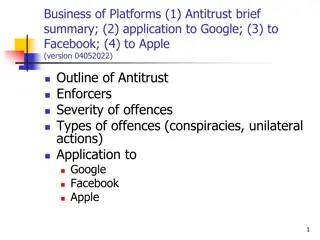Overview of Antitrust Cases and Multistate Enforcement in U.S. Legal History
The content provides a historical overview of significant antitrust cases and multistate enforcement actions in the United States, including key court rulings and landmark legal proceedings involving state participation and enforcement of antitrust laws. It covers cases such as State of Georgia v. Evans, State of Georgia v. Pennsylvania R. Co., and selected state proprietary antitrust cases. Additionally, it discusses the Petroleum Products Antitrust Litigation MDL 150, highlighting the extensive legal battle against antitrust conspiracies by major oil companies.
Download Presentation

Please find below an Image/Link to download the presentation.
The content on the website is provided AS IS for your information and personal use only. It may not be sold, licensed, or shared on other websites without obtaining consent from the author.If you encounter any issues during the download, it is possible that the publisher has removed the file from their server.
You are allowed to download the files provided on this website for personal or commercial use, subject to the condition that they are used lawfully. All files are the property of their respective owners.
The content on the website is provided AS IS for your information and personal use only. It may not be sold, licensed, or shared on other websites without obtaining consent from the author.
E N D
Presentation Transcript
1 NATIONAL ASSOCIATIONOF ATTORNEYS GENERAL EASTERN REGION MEETING BRIEF HISTORY REGARDINGTHE ORIGINS AND EARLY DEVELOPMENTOF MULTISTATE ENFORCEMENT ROBERT M. LANGERAND MIA GRATACOS-ATTERBERRY WIGGINAND DANA LLP AUGUST 2, 2023
2 STATEOF GEORGIAV. EVANS, 316 U.S. 159 (1942) The U.S. Supreme Court held that the State of Georgia, supported by thirty-four states as amici, is a person eligible to seek treble damages under the private remedy provision of the Sherman Antitrust Act. Reason balks against implying denial of such a remedy to a State which purchases materials for use in building public highways. Nothing in the Act, its history, or its policy, could justify so restrictive a construction of the word person in [Section 7] as to exclude a State. 316 U.S. at 162. The importance of the question in the enforcement of the Sherman Law is attested by the fact that thirty-four states, as friends of the Court, supported Georgia's request that the decision be reviewed on certiorari. And so, we brought the case here. 316 U.S. at 161. 2
3 STATEOF GEORGIAV. PENNSYLVANIA R. CO., 324 U.S. 439 (1945) The U.S. Supreme Court held that states may, as parens patriae, seek injunctive relief under Section 16 of the Clayton Antitrust Act for an alleged rate-fixing conspiracy. Since the claim which Georgia asserts as parens patriae as well as proprietor meets the standards of justiciability and since Georgia is a person entitled to enforce the civil sanctions of the anti-trust laws, the reasons which have been advanced for denying Georgia the opportunity to present her cause of action to this Court fail. 324 U.S. at 452. 3
4 SELECTED STATE PROPRIETARY ANTITRUST CASES State of West Virginia v. Chas. Pfizer & Co., 314 F. Supp. 710 (S.D.N.Y. 1970) (Antibiotics) In re Master Key Antitrust Litigation, 528 F.2d 5, 1975-2 Trade Cas. 60,648 (2d Cir. 1975) In re Armored Car Antitrust Litigation, 472 F. Supp. 1357, 1979-1 Trade Cas. 62,662 (N.D.Ga. 1979) In re Fine Paper Antitrust Litigation, 1979 WL 1743, 1980-1 Trade Cas. 63,120 (E.D.Pa. 1979) In re Chicken Antitrust Litigation, 560 F. Supp. 963, 1980-2 Trade Cas. 63,485 (N.D.Ga. 1980) 4 2023
5 PETROLEUM PRODUCTSANTITRUST LITIGATION MDL 150 The case, originally captioned, State of Connecticut v. Amerada Hess, et al., alleging antitrust conspiratorial behavior by the twenty-four largest oil companies, and patterned in part, at least initially, on the FTC case, In the Matter of Exxon Corporation, et al., FTC Docket No. 8934, was first filed in 1973 in the D. Conn. Suits by Florida, Kansas, California, Arizona, Oregon and Washington, as well as Connecticut, were subsequently transferred to the C.D. Cal. by the JPML. The last defendant settled with the last plaintiff in the early 1990 s. 2023 See, e.g., In re Coordinated Pretrial Proceedings in Petroleum Products Antitrust Litigation, 906 F.2d 432, 1990-1 Trade Cas. (CCH) 69,066 (9th Cir. 1990) 5
6 [1FEDERAL FUNDINGOF STATE ANTITRUST ENFORCEMENT [1] Section 116 of the Crime Control Act of 1976 Public Law 94-503 The Attorney General is authorized to provide assistance and make grants to States which have State plans approved under subsection (c) of this section to improve the antitrust enforcement capability of such State. In addition to any other sums appropriated to carry out the purposes of this title, there are authorized to carry out the purposes of this section not to exceed $10,000,000 for fiscal year ending September 30, 1977; not to exceed $10,000,000 for the fiscal year ending September 30, 1978; and not to exceed $10,000,000 for the fiscal year ending September 30, 1979. 6
7 GM ENGINE SWITCH LITIGATION A/K/A CHEVYMOBILE CASE [1] [1] [1] This was the first significant coordinated multistate sovereign enforcement consumer protection initiative. GM had not disclosed to its customers that it had substituted Chevrolet engines in its 1977 Oldsmobiles, Pontiacs, and Cadillacs. What is the value of multistate enforcement? Below is a portion of a New York Times Op-ed piece I wrote in 1978 regarding the potential implications of the Chevymobile settlement. [Negotiations] were successful simply by virtue of the perceived power that state attorneys general collectively possess. The great resources of a few states become a substantial source of leverage that assists other states with lesser abilities to litigate major cases. . . . [T]he probability that large-scale awards will be won in some states provides the impetus to reach agreement with as many states as possible. . . . The GM settlement signals an era in which effective non-Federal consumer protection enforcement by state attorneys general may become commonplace. 7
8 GM ENGINE SWITCH LITIGATIONA/K/A CHEVYMOBILE CASE 8
9. NAAG MULTISTATE ANTITRUST TASK FORCE Significant coordinated litigation by the Task Force prior to Microsoft and Tobacco Selected resale price maintenance ( RPM ) cases prior to Leegin Creative Leather Products, Inc. v. PSKS, Inc., 551 U.S. 877 (2007). In re Minolta Camera Prods. Antitrust Litigation, 668 F. Supp. 456, 1987-1 Trade Cas. 67,622 (D. Md. 1987). In re Panasonic Consumer Elec. Prods. Antitrust Litigation, 1989 WL 63240, 1989-1 Trade Cas. (CCH) 68,613 (S.D.N.Y. 1989). State of New York and Maryland v. Nintendo of America, Inc., 775 F. Supp. 676, 1991-2 Trade Cas. (CCH) 69,614 (S.D.N.Y. 1991). State of Maryland v. Mitsubishi Electronics America, Inc., 1992 WL 88132, 1992-1 Trade Cas. (CCH) 69,743 (D. Md. 1992). 9
10 Clozapine Antitrust Litigation, MDL Docket No. 874 (N.D. Ill.) In 1992, 33 states and D.C. were able to negotiate a resolution valued at about $20 million for consumers nationwide regarding an alleged tying arrangement by Sandoz and Caremark that had conditioned the purchase of the drug, sold under the trade name, Clozaril, upon the purchase of blood-monitoring services exclusively designated by the drug manufacturer. The tying arrangement dramatically increased the cost of a critically important psychotropic drug that provided otherwise treatment-resistant schizophrenic patients the opportunity to enjoy a substantially higher quality of life. 10
11 NAAG MULTISTATE ANTITRUST TASK FORCE Hartford Fire Ins. Co. v. California, 509 U.S. 764 (1993). Nineteen states brought suit alleging a boycott, both domestic and international, that adversely affected the U.S. commercial general liability market. The conduct, as alleged, was not protected by the McCarran- Ferguson Act, and principles of international comity did not preclude application of the Sherman Act to conduct occurring outside the United States. 11
12 HARTFORD FIRE INS. CO. V. CALIFORNIA, 509 U.S. 764 (1993). 12
13 THE COMPACT CLAUSEOFTHE U.S. CONSTITUTION, ANDITS RELATIONSHIP (ORLACKTHEREOF) TOMULTISTATEENFORCEMENT U.S. Steel Corp. v. Multistate Tax Commission, 434 U.S. 452 (1978) Group action in itself may be more influential than independent actions by the States. But the test is whether the Compact enhances state power quoad the National Government. This pact does not purport to authorize the member States to exercise any powers they could not exercise in its absence. Nor is there any delegation of sovereign power to the Commission; each State retains complete freedom to adopt or reject the rules and regulations of the Commission. Moreover, as noted above, each State is free to withdraw at any time. Star Scientific Inc. v. Beales, 278 F.3d 339, 359-60 (4th Cir. 2002) Master Settlement Agreement entered into between the Attorneys General of forty-six States and four major tobacco manufacturers did not violate the Compact Clause Mariana v. Fisher, 226 F. Supp. 2d 575, 586-87 (M.D. Pa. 2002) Same as above 13
14 SELECTED KEY U.S. SUPREME COURT CASES THAT HAVE ENHANCED STATES MULTISTATE EFFORTS California v. ARC America Corp., 490 U.S. 93 (1989) The state indirect purchaser statutes are not pre-empted by the federal antitrust laws. There is no claim of express pre-emption or of congressional occupation of the field. The claim that the state laws are inconsistent with, and stand as an obstacle to, effectuating the congressional purposes identified in Hanover Shoe and Illinois Brick misunderstands these cases, which merely construed the federal antitrust laws and did not consider state- law or pre-emption standards or define the interrelationship between the federal and state law. Nothing in Illinois Brick suggests that it would be contrary to congressional purposes for States to allow indirect purchasers to recover under their own antitrust laws. Id. California v. American Stores Co., 495 U.S. 271 (1990) [Divestiture] is a form of injunctive relief within the meaning of 16 of the Clayton Act. 495 U.S. at 296. 14
15 ( SELECTED KEY U.S. SUPREME COURT CASES THAT DEMONSTRATE, AS AMICI, THAT THE STATES COLLECTIVELY ARE A MAJOR FORCE REGARDING THE DEVELOPMENT OF THE ANTITRUST LAWS Texaco Inc. v. Hasbrouck, 496 U.S. 543 (1990) [T]he [Robinson-Patman] Act does not tolerate a functional discount that is completely untethered either to the supplier's savings or the wholesaler's costs. 496 U.S. at 544. Eastman Kodak Co. v. Image Technical Services, Inc.,504 U.S. 451 (1992) The absence of market power in an interbrand market, i.e., copiers, does not preclude a finding that a per se tying arrangement may exist in the aftermarket for parts and service. The states, as amici, opposed the position of both Kodak and the United States, that Kodak was entitled to summary judgment, as a matter of law, because Kodak did not possess market power in the interbrand copier market. FTC v. Ticor Title Ins. Co.,504 U.S. 621 (1992) The states, as amici, supported the position of the FTC that negative option tariff filings with state insurance regulators do not comport with the active supervision component of the state action immunity doctrine Respondents contend that principles of federalism justify a broad interpretation of state-action immunity, but there is a powerful refutation of their viewpoint in the briefs that were filed in this case. The State of Wisconsin, joined by Montana and 34 other States, has filed a brief as amici curiae on the precise point. These States deny that respondents' broad immunity rule would serve the States' best interests. We are in agreement with the amici submission. 504 U.S. at 635. 15
16 ( ADDITIONAL RESOURCES National Association of Attorneys Antitrust Centennial Symposium, 29 Washburn Law Journal No. 2 (Winter 1990, pp. 141-367) (articles and speeches by a total of twenty-three academicians, federal and state government officials in recognition of the adoption by Kansas in 1889 of the first comprehensive state antitrust law. The Symposium was held at the University of Kansas School of Law, Lawrence, KS, in 1989.) Centennial Celebration Creation of NAAG Current and former state attorneys general, and former chairs of the NAAG Multistate Antitrust Task Force discussed, inter alia, NAAG s role in the development of multistate antitrust enforcement. The event took place in St. Louis in 2007. A partial uncorrected transcript of the event is available. Richard Blumenthal, Robert M. Langer and William M. Rubenstein, Antitrust Review of Mergers by State Attorneys General: The New Cops on the Beat, 67 Connecticut Bar Journal No. 1 (February 1993, pp. 1-14) 16
17 ( ADDITIONAL RESOURCES Presentations by the first seven Chairs of the NAAG Multistate Antitrust Task Force at the Spring Meetings of the ABA Antitrust Law Section: Lloyd Constantine - 56 ANTITRUST LAW JOURNAL 11 (1987); Michael F. Brockmeyer - 59 ANTITRUST LAW JOURNAL 25 (1990); Robert M. Langer - 60 ANTITRUST LAW JOURNAL 197 (1991); 61 ANTITRUST LAW JOURNAL 211 (1992); Laurel Price - 62 ANTITRUST LAW JOURNAL 247 (1993); 63 ANTITRUST LAW JOURNAL 303 (1994); 63 ANTITRUST LAW JOURNAL 951 (1995); Kevin J. O Connor - 64 ANTITRUST LAW JOURNAL 749 (1996); 65 ANTITRUST LAW JOURNAL 929 (1997); 66 ANTITRUST LAW JOURNAL 805 (1998); Thomas Greene - 67 ANTITRUST LAW JOURNAL 453 (1999); 68 ANTITRUST LAW JOURNAL 581 (2000); 69 ANTITRUST LAW JOURNAL 367 (2001); Patricia A. Conners - 70 ANTITRUST LAW JOURNAL 261 (2002); 71 ANTITRUST LAW JOURNAL 333 (2003); 72 ANTITRUST LAW JOURNAL 283 (2004). 60 ALJ 197 (1991); and 61 ALJ 211 (1992)6 17
18 ( ADDITIONAL RESOURCES Oral History Interviews of Several Chairs of the NAAG Multistate Antitrust Task Force: Lloyd Constantine - Oral History: Lloyd Constantine (americanbar.org) Michael F. Brockmeyer - Oral History: Michael Brockmeyer (americanbar.org) Robert M. Langer - Oral History: Robert Langer (americanbar.org) Laurel Price - Oral History: Laurel Price (americanbar.org) Kevin J. O Connor - Oral History: Kevin O'Connor (americanbar.org) Robert L. Hubbard - Oral History: Robert L. Hubbard (americanbar.org) 18




